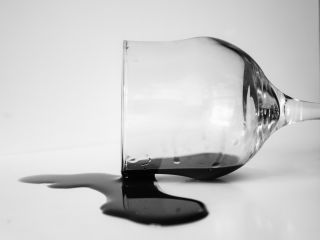Personal Perspectives
Why I Quit Drinking
Personal Perspective: Here's why I drank in the first place.
Posted February 29, 2024 Reviewed by Ray Parker
Key points
- Long-term sobriety takes work, but it's worth it.
- Sometimes, it's good to revisit why you drank alcohol.
- It's also good to remind yourself of why you quit.
- These reminders can help someone stay sober.

This past January, I celebrated 10 years of sobriety. The celebration was subdued; my husband and I watched a movie, and I rang in the new year in my pajamas. It was lovely.
In marriages, 10th-anniversary gifts are traditionally tin or aluminum, symbolizing resiliency and encouraging, I guess, proper food packaging. But my 10-year sober birthday was celebrated with a kiss from my husband and a really deep feeling of contentment in me. For 10 years, I had been living life sober, and I was proud of myself.
And then February hit. And I found myself, one night, in a fit of frustration about a long-term goal that I was still working on and trying to achieve, I was anxious, restless, and tired of the endless work of life. What happens with bad feelings like this is that they like to stick to other bad feelings. They're not picky; they'll grab onto any ickiness hanging around, like my hatred for the flooring in my laundry room, that my knees are not as cute as they once were, or the coming election year. Just any random thing would work, and before I knew it, my discontent had become a great big glob of "Mad."
I told my husband: "This would be a whole lot easier if I could have some tequila," and my husband, Brian, answered without a beat, "No, of course, it would not." I sighed.
About twice a year, I say stuff like this, and even as the words come out of my mouth and float around the kitchen as the husband washes dishes and I lean against the counter, it feels false. But every once in a while, when I'm feeling very sorry for myself or just cantankerous, I want to fight. I want to whine a little. I want to test and see if Brian is listening.
I want to see if I'm listening, too.
And as soon as those words hit the air, they snuff out, doused by reality and the hard work of sobriety.
Brian's retort isn't what kept me from drinking. It is super nice to have his support, and his rote response of "Oh, shut up already" is good for me. But I'm the one that chooses not to drink. Just like when I was drinking, he wasn't the one that led me to alcoholism. I was very much in charge of that as well.
So, I was thinking it would be good to remind myself about why I got sober. And when I started to list the many reasons why, it became more important to remember why I drank in the first place.
I drank because I wanted a shield. I felt like the world was always coming at me, lobbing arrows of obligation or exhaustion my way, and I needed armor. I didn't really understand this at all, but I felt lousy about it. I was talking, meeting, and going out at night. It made me feel flimsy, scared, and so tired, even before leaving the house. So I drank.
I drank because I was not a good enough mother, and I felt people noticed this a lot but never said anything. I was scared that one day, they would all point at me and shout, "Ah, she's the worst." So, I drank because it gave me the energy to clean the house, do all the lesson plans, use a cheerful voice with the boys, and be on it for all the things for about an hour.
I drank because I could not deeply connect and trust my husband. Wine seemed to help this when, really, there was no foundation. My feelings were flimsy set pieces held up by plywood and fake lighting.
I drank because I felt horribly guilty about my drinking.
This list is good to revisit every once in a while, to remind me of the insanity that I had hunkered down into for over 20 years. It's good to walk up to the edge of the abyss and peer down just to make sure you remember its gloom. Dread was there, and I got away.
I am so very grateful.


